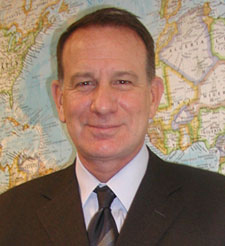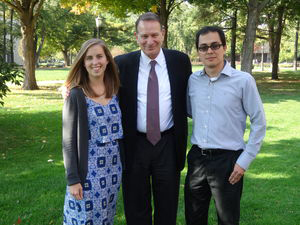 Dr. Bernard Nahlen ’75
Dr. Bernard Nahlen ’75
The 2014 Paul P. Weinstein Memorial Lecture presented by the Eck Institute for Global Health featured alumnus Dr. Bernard Nahlen ’75, deputy coordinator of the President’s Malaria Initiative for USAID’s Bureau for Global Health. After graduating from Notre Dame with a Bachelor of Arts degree in American studies, Nahlen went on to receive his medical degree from the University of Arkansas in Little Rock.
Nahlen’s work is part of the University of Notre Dame’s deep and rich tradition of research and training programs focused on reducing the burden of tropical infectious diseases around the globe. In honor of that tradition, the Eck Institute for Global Health established the Paul P. Weinstein Memorial Lecture to recognize the excellence that Weinstein brought to a life dedicated to advancing research on infectious diseases and training multiple generations of scientists.
In 1946, Weinstein served as a captain in the U.S. Public Health Service, where he played a significant role in the establishment of the Communicable Diseases Center—now the Centers for Disease Control and Prevention. He spent the next 20 years at the National Institutes of Health, where he retired in 1968 as the director of the Laboratory of Parasitic Diseases. Weinstein, a leading authority on parasitology, vector biology, and public health, then joined the Department of Biological Sciences at the University of Notre Dame as professor and department chair. For more than 21 years, he was an exceptional researcher, teacher, and mentor. Reflecting his passion for research, he continued working and publishing after his retirement from teaching in 1990 until his death in 2008.
Nahlen was chosen to give the 2014 Weinstein Memorial Lecture because his career embodies the ideals and achievements of Weinstein. Both men were heavily involved in the prestigious American Society for Tropical Medicine and Hygiene and, similarly, devoted much of their research to a better understanding of the parasites that cause human suffering and death from vector-borne diseases that have plagued man since the dawn of time.
“Nahlen is a global leader dedicated to addressing malaria,” said Frank Collins, George and Winifred Clark Professor of Biological Sciences and member of the Eck Institute for Global Health. “In addition to this achievement, he also remains a major contributor to HIV research and still produces papers on the subject.”
 At Nahlen’s request, his speaking fee will be used instead to send Notre Dame graduate student Gwyneth Sullivan (left) and postdoctoral research associate Diego Echeverri-Garcia (right) to present their posters on malaria at the American Society for Tropical Medicine and Hygiene Conference.
At Nahlen’s request, his speaking fee will be used instead to send Notre Dame graduate student Gwyneth Sullivan (left) and postdoctoral research associate Diego Echeverri-Garcia (right) to present their posters on malaria at the American Society for Tropical Medicine and Hygiene Conference.
His lecture focused on the global effort toward malaria elimination and pointed out that, “disease elimination is not just about science but also making policy decisions.” Nahlen stressed the importance of addressing policy as the next step of global leadership and emphasized that considering the health burden, economic burden, and health systems burden of the disease all need to be part of the effort and plan going forward.
In 1983, Nahlen completed a residency in family practice at the University of California, San Francisco, before joining the U.S. Centers for Disease Control and Prevention in 1986 as an epidemic intelligence service officer. In 1989, he completed a second residency in preventive medicine and later served as deputy director of the Los Angeles County AIDS Epidemiology Program. Nahlen’s commitment to malaria prevention and control subsequently took him to Kenya in 1992 as director of the CDC field research station, in collaboration with the Kenya Medical Research Institute. In 2000, he served as senior technical advisor to the WHO Malaria Programme. At the WHO, he led the Monitoring and Evaluation Team as well as the Malaria in Pregnancy Team. He served as the first chair of the Roll Back Malaria Monitoring and Evaluation Reference Group. From 2005-2006, he was senior advisor in the Performance Evaluation and Policy Unit of the Global Fund to Fight AIDS, Tuberculosis, and Malaria. In addition, Nahlen has authored or co-authored more than 150 articles related to malaria prevention and control.
In the last 50 years, international campaigns to eradicate malaria have made substantial progress in many areas—mainly outside Africa, which was largely excluded from this “global” strategy. Despite initial success, with the emergence and spread of chloroquine-resistant Plasmodium falciparum parasites and DDT-resistant Anopheles mosquitoes, political and financial commitments soon began to wane. Sadly, this resulted in a global resurgence of malaria, including in areas where it had been eliminated. In October 2007, Bill and Melinda Gates issued a renewed call for complete eradication to be adopted as the long-term global goal in the fight against malaria, a vision that was immediately echoed by the World Health Organization. Recent successes in reducing malaria morbidity and mortality in Africa and progress in the development of new tools have provided new impetus for this vision.
According to Nahlen, the most effective control programs deliver a combination of tools and the efficacy of the current tools will continue to be challenged by changes in the parasite and the mosquito. Therefore, while it will be possible to eliminate malaria from many areas with the tools available now, major investments in research to improve existing tools and delivery strategies and to develop new tools will be required to eradicate malaria. To achieve this ambitious goal, global policy change must be part of the formula.
The Eck Institute for Global Health is a university-wide enterprise that recognizes health as a fundamental human right and endeavors to promote research, training, service to advance health standards for all people, especially people in low and middle-income countries, who are disproportionately impacted by preventable diseases.
Originally published at globalhealth.nd.edu.


